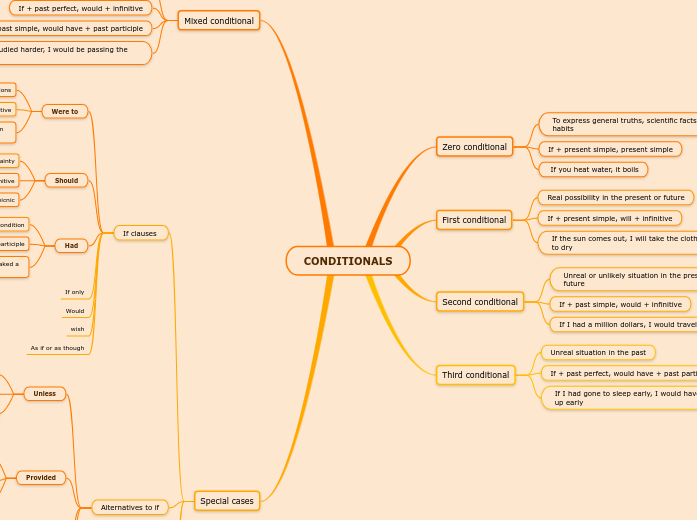CONDITIONALS
Zero conditional
To express general truths, scientific facts, or habits
If + present simple, present simple
If you heat water, it boils
First conditional
Real possibility in the present or future
If + present simple, will + infinitive
If the sun comes out, I will take the clothes out to dry
Second conditional
Unreal or unlikely situation in the present or future
If + past simple, would + infinitive
If I had a million dollars, I would travel the world
Third conditional
Unreal situation in the past
If + past perfect, would have + past participle
If I had gone to sleep early, I would have gotten up early
Mixed conditional
Mixing past and present unreal situations
If + past perfect, would + infinitive
If + past simple, would have + past participle
If I had studied harder, I would be passing the exam now
Special cases
If clauses
Were to
More formal and less likely situations
If + subject + were to + infinitive, would + infinitive
If I were to win the lottery, I would donate a large sum to charity
Should
Less likely situations, often with uncertainty
Should + subject + infinitive, would + infinitive
Should it rain, we will cancel the picnic
Had
Expresses a past unreal condition
If I had + past participle, would have + past participle
If I had known you were coming, I would have baked a cake
If only
Would
wish
As if or as though
Alternatives to if
Unless
To express a negative condition, similar to if...not
Unless + positive statement
Unless you study hard, you won't pass the exam
Provided
Indicates a condition that must be met for something to happen, necessary conditions
so long as
but for
Provided that + clause, main clause
Provided that you study hard, you will pass the exam.
Supposing/ Suppose or What if
Introduces a hypothetical situation, is for imaginary conditions
Supposing/Suppose or What if + clause, main clause
Supposing you won the lottery, what would you do?
In case
Is to imagine a future situation, we often use to imagine precaution necessary, it´s not the same a as If
In case of + clause, main clause
In case of fire, use the fire extinguisher
Inverse conditional
Use: Used to express a condition that is the opposite of what is true or likely
Form: If + negative clause, positive main clause
If I were not tired, I would go out
Reduced conditional
Use: Often used in informal speech and writing to make sentences more concise.
Form: Omit "if" and invert the subject and verb of the if-clause.
Had I known, I would have told you.
